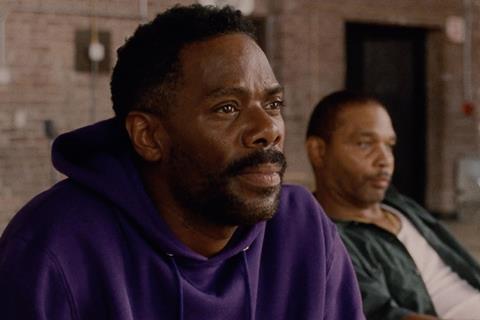Colman Domingo takes centre stage in this play on a real-life New York theatre programme for prisoners

Dir: Greg Kwedar. US. 2023. 107mins
Telling a fictionalised story based on an actual New York theatre programme for prisoners, Sing Sing draws power from its real-world gravitas and Colman Domingo’s commanding central performance. Director Greg Kwedar collaborates with former and current inmates to follow the staging of the troupe’s latest play, which proves both cathartic and triggering for these men. If the film’s narrative sometimes goes slack, the compensation comes from the script’s careful examination of how prison can profoundly harm individuals — whether or not they are guilty of the crimes the government says they have committed.
The script’s warm, crowd-pleasing tenor seeks to offset the potential bleakness
Sing Sing has travelled a long road to become an awards-season contender. Premiering at the Toronto Film Festival in 2023, the drama opened in the US and UK in summer 2024 to generally strong reviews. Still, this low-budget indie has only grossed about $3.4 million worldwide, although possible Academy Award nominations could help when the picture comes to streaming.
Divine G (Domingo) has spent years in a New York prison, insistent that he’s innocent and doggedly preparing himself for his next parole hearing. In the meantime, he finds solace as part of Rehabilitation Through The Arts (RTA), a penitentiary programme in which the incarcerated can write and act in plays. Although theatre director Brent (Paul Raci) leads the group, the veteran cast members look at Divine G as their finest actor and unofficial spokesperson, and he suggests they recruit new performers for their next production — specifically, the charismatic but intimidating Divine Eye (Clarence ’Divine Eye’ Maclin).
Many in Sing Sing’s ensemble are former RTA participants playing fictionalised versions of themselves, and the effortless authenticity that they bring to their roles goes a long way towards suggesting their characters’ vulnerability and pain. (The film was shot in a decommissioned New York maximum-security correctional facility.) Kwedar and his longtime creative partner Clint Bentley — who last worked on 2021’s Jockey — specialise in stories that require the filmmakers to embed themselves in a particular milieu, and this latest project found the duo meeting with Maclin and the real-life Divine G, also known as John Whitfield, to build a narrative around the inner workings of the RTA programme.
Not surprisingly, the film features an unvarnished look at life in a penitentiary, although the script’s warm, crowd-pleasing tenor seeks to offset the potential bleakness. As Brent and his troupe start developing their next production, Sing Sing focuses on the tense rapport between Divine G and Divine Eye, who initially rejects the older man’s attempts to take him under his wing. The hostile Divine Eye eventually connects with his creative side but, even so, he resents Divine G’s condescending acting advice.
Domingo plays the poetic prisoner as a man who has always been devoted to art, but the actor also reveals Divine G’s ego and self-absorption — how he has used RTA, in part, to show off his skills as a performer, enjoying the awed admiration of his peers. The poised, surprisingly adept Divine Eye doesn’t just challenge his standing on stage but also in the jail yard, refusing to accept Divine G’s kindly-older-brother routine, which he feels is inspired by Divine G’s assumption that he’s morally superior to his fellow prisoners.
Maclin is a revelation, bringing an edgy intensity to his role, the character threatening at any moment to erupt into violence. But there are also haunted depths to Divine Eye, which Maclin brings to the surface. Like the RTA program itself, Sing Sing argues that the incarcerated need not lose their humanity behind bars, and the film succeeds most when it watches these amateur performers access difficult emotions — like shame, anger, guilt and sorrow — in front of one another while rehearsing their roles. The original play they are preparing, written by Brent based on the prisoners’ disparate ideas, hardly seems a masterpiece, but that doesn’t matter. The chance for these so-called hardened men to access their gentler, more wounded selves is entirely the point.
The individual trajectories of Divine G and Divine Eye — one wrongfully incarcerated, the other a frequent offender — are mapped out a little too neatly and, as arresting as Domingo is, he occasionally must try to sell character twists that beg credulity. And while audiences will come to care about this troupe — including actor Sean San Jose, who plays Divine G’s close friend and fellow thespian Mike Mike — Sing Sing leans into a heartwarming finale that feels a little overly manufactured. Kwedar never denies the harsh realities of the penitentiary system but, by preferring an ultimately hopeful tone, he eventually falls victim to some of the tropes of the prison drama which his thoughtful picture had, until that point, mostly sidestepped.
Production company: Black Bear
International sales: Black Bear, info@blackbearpictures.com
Producers: Monique Walton, Clint Bentley, Greg Kwedar
Screenplay: Clint Bentley, Greg Kwedar; story by Clint Bentley, Greg Kwedar, Clarence ‘Divine Eye’ Maclin, John “Divine G” Whitfield; based on The Sing Sing Follies by John H. Richardson, Breakin’ The Mummy’s Code by Brent Buell
Cinematography: Pat Scola
Production design: Ruta Kiskyte
Editing: Parker Laramie
Music: Bryce Dessner
Main cast: Colman Domingo, Clarence “Divine Eye” Maclin, Sean San Jose, Paul Raci
























